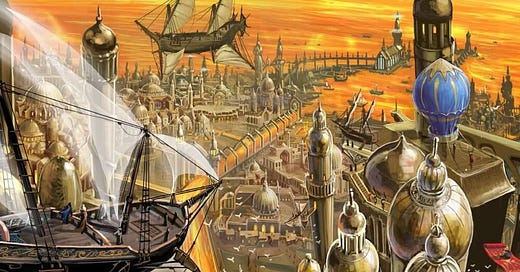“To keep walking a path between loyalty to your family and loyalty to what you know is right. One of these days, you’re going to have to make a choice.”
Nahri is a young woman scraping a living by scamming foolish patrons in 18th-century Cairo. Harbouring the power of healing and mastering various languages with ease, Nahri is more than just a lonely social outcast, though she has no inkling of her true heritage. It is only upon attempting to pseudo-exorcise a young girl in an ancient tongue that she accidentally summons an ancient being; a Djinn, named Dara(yavahoush), who educates Nahri on her heritage as the descendant of a powerful djinn healer tribe (the Nahids). Nahri and Dara embark on a whirlwind adventure to the mesmerising capital of the djinn, Daevabad, the City of Brass.
“The wall itself shone brilliantly in the bright sun, the light glistening off the golden surface like… ‘Brass’, she whispered. The massive wall was entirely built of brass, polished to perfection.”
Within Daevabad resides our second protagonist, Alizayd al-Qahtani, the second son of the djinn king of Daevabad, currently training to be a Qaid (commander) to his older brother who will eventually be king. A devout, practising Muslim who secretly strives for djinn equality, Ali is conflicted between loyalty to his father, who turns a blind eye to the oppression of lower djinn races (e.g. Shafit - half djinn/half human, Daeva - fire-worshippers), and loyalty to the people who are suffering due to his father’s rule. Nahri’s arrival in Daevabad complicates things, not only for the Qahtani’s, but for the future of the city as a whole.
I have mixed feelings about this novel, so I’ll start with what I enjoyed. Firstly, the world-building was excellent. I found myself fully immersed in the diverse, dazzling world of Daevabad, and I liked the influence of Islam and various eastern cultures in shaping the story. Although the character development wasn’t a standout feature in the novel, the characters felt realistic and relatable, particularly Ali, who for the most part stuck to his principles despite his royal title and when tempted by the glitz and glamour of Daevabad. Secondly, the writing was wonderfully descriptive, making for a compelling read. The dialogue between characters felt also natural, though at certain points it was evident that a conversation took place just to explain plot points.
What I mostly struggled with was the pacing of the story. The first third of the book dragged so much I considered DNF’ing (but I despise doing that, so I had no choice but to power through). Some scenes felt long and boring and others were interesting but too short. I’m glad I carried on though, because the story picked up and I enjoyed it a lot more after the initial chapters. I’m aware that this was Charkraborty’s debut novel, so I’ll cut her some slack. I’ve also heard the subsequent books in this trilogy are better in terms of pacing.
Another thing I struggled with was the overwhelming amount of names, places, races, and lore surrounding Daevabad and the existence of the different types of djinn. I ended up dog-earring pages that contained salient pieces of information about the history of the djinn because it was difficult to keep track. There are different types of beings that correlate with the four elements: the daeva/djinn are fire beings, marid are water beings, peri are air beings etc. The daeva/djinn are divided into six tribes: Turkharistani, Agnivanshi, Geziri, Ayaanle, Sahrayn, and Daevas (broadly based around Middle Eastern/African/South Asian peoples).
The author takes liberties with the mythology/lore around the division of the djinn tribes, conjuring up a tale about Prophet Suleiman [AS], his seal ring and his segmentation of the djinn race which caused them to mate with humans, creating a new half-human half-djinn race. I’m not sure how I feel about authors weaving revered religious figures (such as prophets) into works of fiction, particularly fantasy. Is this problematic? Or could this be likened to mufassirun including isra'iliyat in their tafsirs?
“He trapped us in humanlike bodies,” Dara explained. “Bodies with limited abilities that only lasted a few centuries.” / “Suleiman not only gave Anahid healing abilities, he gave her his seal ring, and with it the ability to undo any magic.”
Some final points – I don’t know if it’s just the UK copies of this book, but I found the font style and size annoying, it was hard to read and I think that contributed to me constantly putting the book down when I first started. There was also a subtle allusion to an lgbt relationship towards the end of the book involving a major character. I was a bit surprised by this as I’d heard it’s only really prominent in the final book. I am interested enough to read the second book at some point.
One of my favourite dialogues from the novel:
“Oh, calm down, Sheikh." Zaynab shivered. "It's cold up here."
"Cold? We're djinn! You are literally created from fire.”





